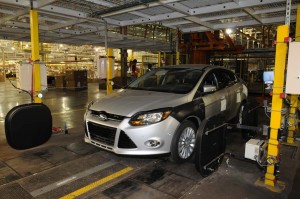Things haven’t been going well for the United Auto Workers Union in recent years. The maker has not only had to grant significant concessions to Detroit’s Big Three automakers, but membership has been steadily declining – the result of the Motor City’s decline as well as the impact of productivity gains.
After years of decline, however, things may be turning around. The UAW has filed its annual report with the U.S. Labor Department, showing the first increase in membership in recent memory – though the union’s rolls remain but a fraction of their one-time peak.
The UAW’s 2010 LM-2 report shows membership increasing from 355,191 in 2009 to 376,612 in 2010. But that’s still down by nearly half from 2001, when membership stood at 701,818. The long-influential UAW’s rolls peaked in 1979, when it counted 1.53 million dues-paying members.
“We are pleased that our membership increased in 2010 by 21,000,” said UAW President Bob King. “This increase is a reflection of new organizing by the UAW, the recovery of the domestic auto industry and UAW members who won a first contract during the year. We hope to continue this growth in 2011 and beyond, as we fight to win a more fair and democratic process for workers to organize unions in the United States,” he said.
The sharp decline in the Autoworkers Union’s ranks, over the last two decades reflects a changing world. Back then, a typical automotive assembly plant could rely on more than 5,000 employees to turn out 250,000 cars a year. Today, 2,000 factory workers is closer to the norm.
Meanwhile, Detroit now controls barely half of the American automotive market, down from four-fifths when the UAW hit its peak.
Significantly, after seeing much of that lost market share shift to overseas assembly plants, foreign-based makers, such as Toyota, Honda, BMW and, soon, Volkswagen, have reversed that offshore migration. Toyota, for example, now assembles nearly two-thirds of the vehicles it sells in the U.S. at North American factories. But, with only a few exceptions, those “transplant” assembly lines operate without unions.
If the UAW has its way, that will change. Union boss King indicated the union is looking for ways to recruit more members via an ambitious campaign to sign up new members at transplants run by foreign automakers.
Earlier this year, the union released its UAW Principles for Fair Union Elections, which embody what it described as common sense principles inherent in any democratic election. The underlying principle is that the right to organize a union is a fundamental human right and that workers should be able to exercise this right in an atmosphere free from threats, intimidation or coercion.
The UAW has been negotiating with a number of the transplant operators in a bid to convince them to agree to honor the principles and hold what it terms fair elections. To add weight to its argument, the union is threatening to stage a worldwide boycott of manufacturers that decline to participate.
A target company is expected to be chosen in the coming weeks. (For that story, Click Here.)
The UAW will negotiate new contracts with the Detroit makers this year. Clauses in the government bailouts of Chrysler and General Motors bar strikes, though union negotiators suggest they have alternative ways to provide pressure.
Nonetheless, King has indicated that efforts will be made to avoid a confrontation. While there is strong rank-and-file pressure to recover some concessions, most observers believe the UAW will more likely seek to sweeten its profit sharing agreements with the three makers. (For that story, Click Here.)
Indeed, following their recent national convention, senior union officials dropped hints that they would even be open to expanding a new two-tier wage structure if it meant bringing back more jobs – and dues-paying members.
Paul A. Eisenstein contributed to this report.

